Participants discuss covenant relationships, peer reviews and church revitalization
[Español]
By Janie Beck Kreider
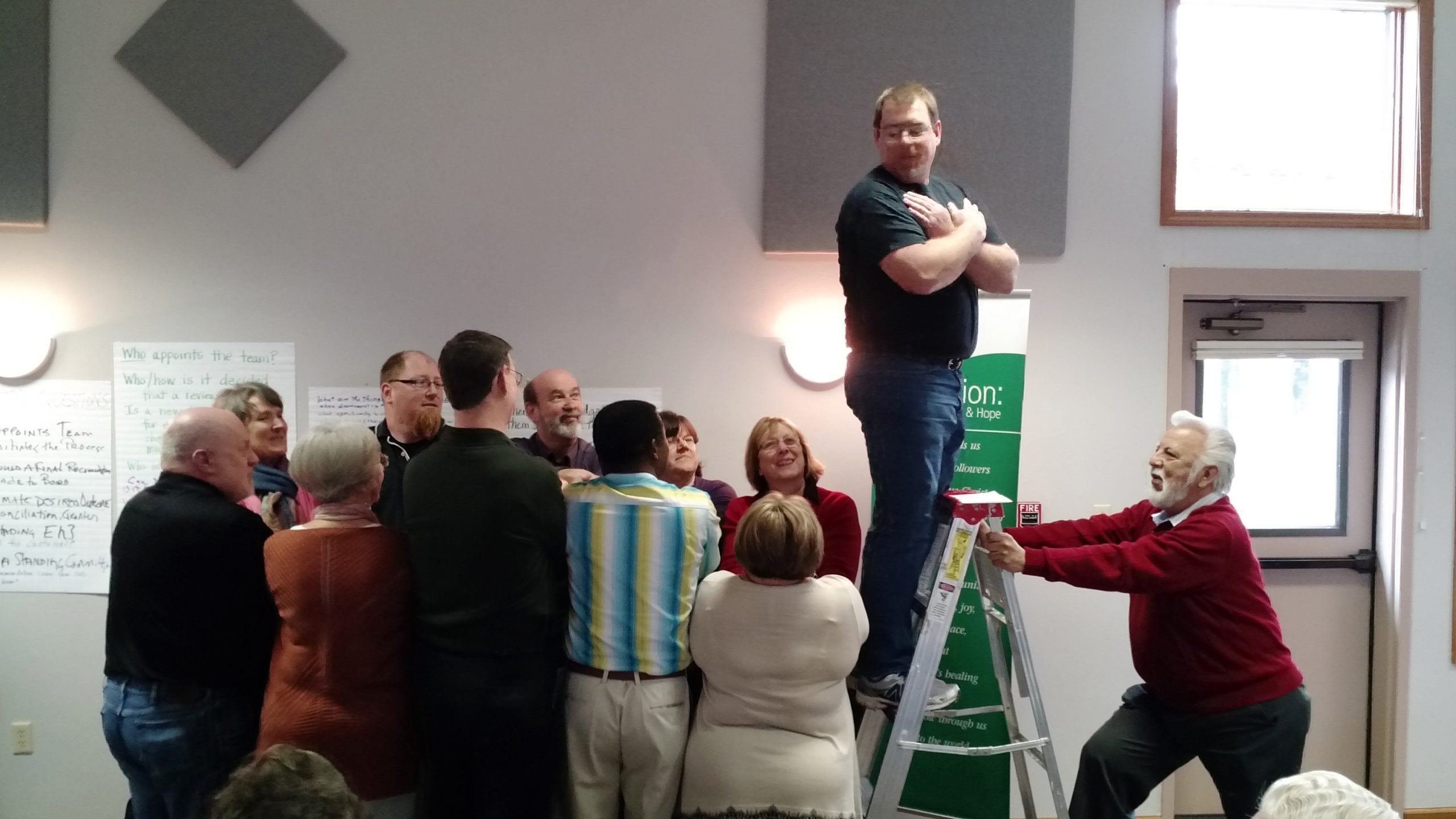
Rodger Schmell, representing Eastern District Conference, prepares for a “trust fall” into the arms of fellow Constituency Leaders Council (CLC) members representing multiple theological perspectives across the denomination during the CLC’s March 2016 meeting. Lupe Aguilar, representing South Central Mennonite Conference, holds the ladder. (Photo by Janie Beck Kreider)
GOSHEN, Indiana (Mennonite Church USA) — Nearly 70 denominational leaders gathered March 7–9 at Silverwood Mennonite Church in Goshen, Indiana, for the second Constituency Leaders Council (CLC) meeting of the 2015–17 biennium.
CLC members worked at trust-building as they heard multiple perspectives on the meaning of covenant relationships and nurtured hope by dreaming together about the denomination’s missional future. Other agenda items included follow-up discussions on the CLC’s role as denominational elders, review of a proposal to create a conference peer-to-peer review process, and discussion of potential alternatives to the resolutions process at delegate assemblies.
“This meeting matters because we have come together in the wake of losing conferences, even while others are in the process of making decisions,” said Jennifer Delanty, moderator of Pacific Northwest Mennonite Conference, in her CLC Listening Committee report. “Even in the midst of all this, we are beginning something new. There is healing going on. There is need for us to continue to be together and discern what God has in place for us going forward.”
Role as elders affirmed
CLC members reviewed and adopted a statement summarizing conversations from their October 2015 meeting about defining eldership and outlining the CLC’s responsibilities as denominational elders.
The statement describes the council’s role as to “listen deeply in order to hear/see the ‘big’ picture; pay attention to the guidance of the Holy Spirit, God (Bible and prayer); model a missional community/collective; and offer counsel and direction to the Executive Board (EB) as well as the broader church.” The statement also named guidelines for how the CLC will interact with conferences “when we are in conference-to-conference conflict” and “when conferences and congregations question their willingness to be part of their conference and/or Mennonite Church USA.”
Covenantal commitments
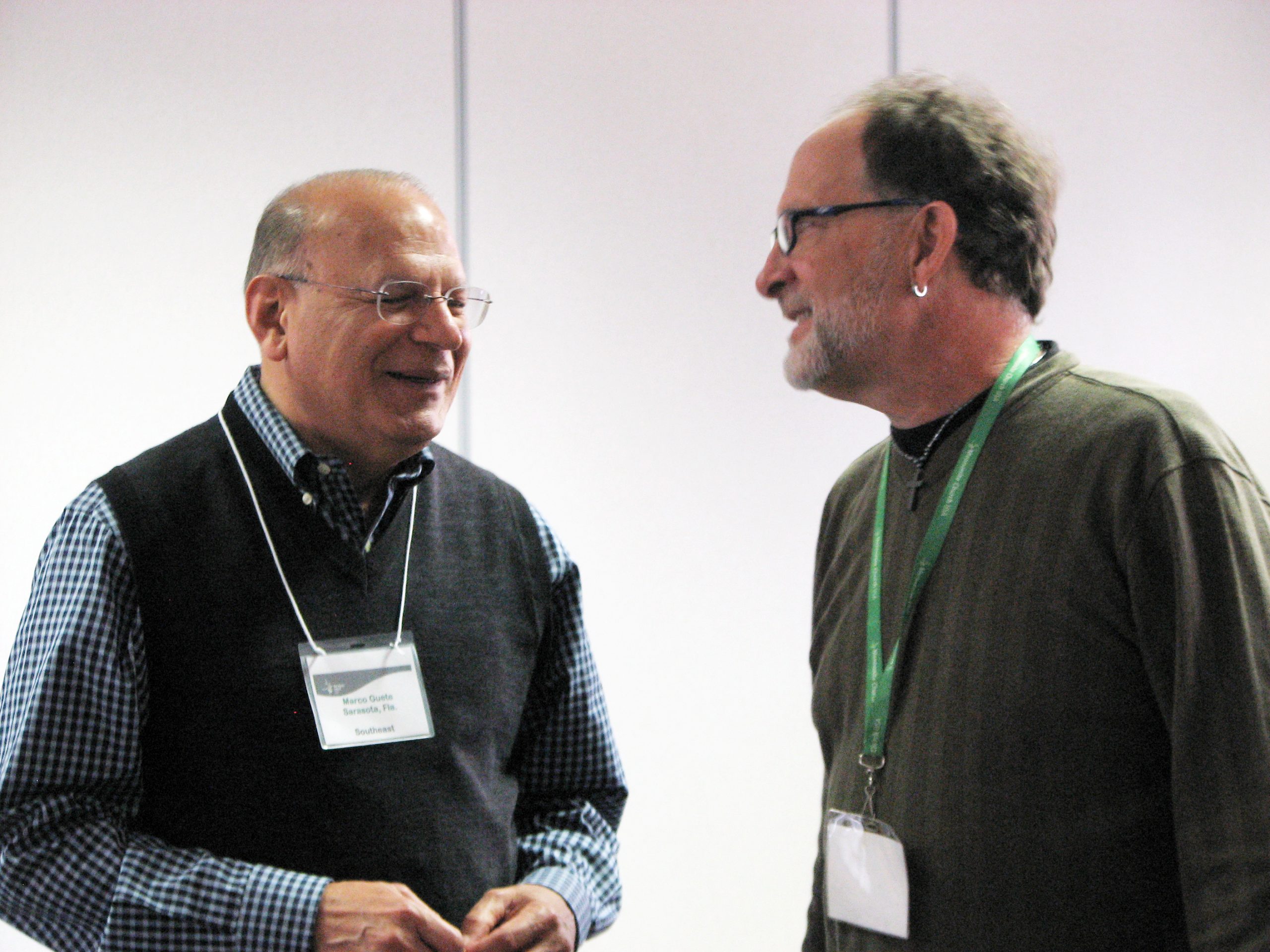
Marco Güete, executive conference minister for Southeast Mennonite Conference, talks with Michael Zehr, Southeast Mennonite Conference moderator, at the March Constituency Leaders Council meeting at Silverwood Mennonite Church in Goshen, Indiana. (Photo by Annette Brill Bergstresser)
Near the beginning of the meeting, Moderator-elect and CLC Chair David Boshart offered a sketch of the biblical concept of covenant and a working definition for reflection: “A covenant is an offer of a holistic relationship based on an unconditional promise memorialized in a sign.” “In the New Testament,” said Boshart, “the people of God themselves — those who have passed through the baptismal waters — become that sign.”
Kurt Horst, representing South Central Mennonite Conference, was invited to present a statement to the CLC on covenant relationships in Mennonite Church USA, which he did with the support of the South Central Conference Executive Committee.
Horst gave a personal testimony reflecting on the pain of broken covenant relationships among conferences that led him to question his participation in CLC, though he said he has not “found the spiritual release to withdraw.” Horst said that, from his perspective, both the action of conferences licensing pastors in same-sex relationships as well as the action of conferences withdrawing “without clearly naming their unmet expectations, and without allowing other conferences to be involved in their withdrawal” constitute a violation of covenant.
CLC planners asked Bishop Leslie Francisco III, representing the African American Mennonite Association (AAMA), and Lois Johns Kaufmann, conference minister for Central District Conference, to prepare brief responses to Horst’s sharing.
Francisco used an aviation metaphor to encourage the church to “be true to its polity” and “trust the instruments we have to aviate, navigate and communicate” in the midst of rapid change.
“The question is not if we’re in favor of or opposed to same-sex marriage,” he said. “The question is how do we do church together? Until that question is answered, we should use our current agreements to guide us to a safe position.”
In her response, Kaufmann noted that delegates passed the forbearance resolution because there is not consensus within Mennonite Church USA and that Central District Conference leadership feels led to move in a direction that is at odds with what the Executive Board and the delegates have officially affirmed.
“We would like to see space for parts of the church to continue to test this direction,” she said. “Our decision is rooted in our understanding of the Bible, and we acknowledge that not everyone in our churches reads the Bible the same way. We also need to ask ourselves: How does change happen? Have all changes waited until there was denominational consensus?”
Peer review model
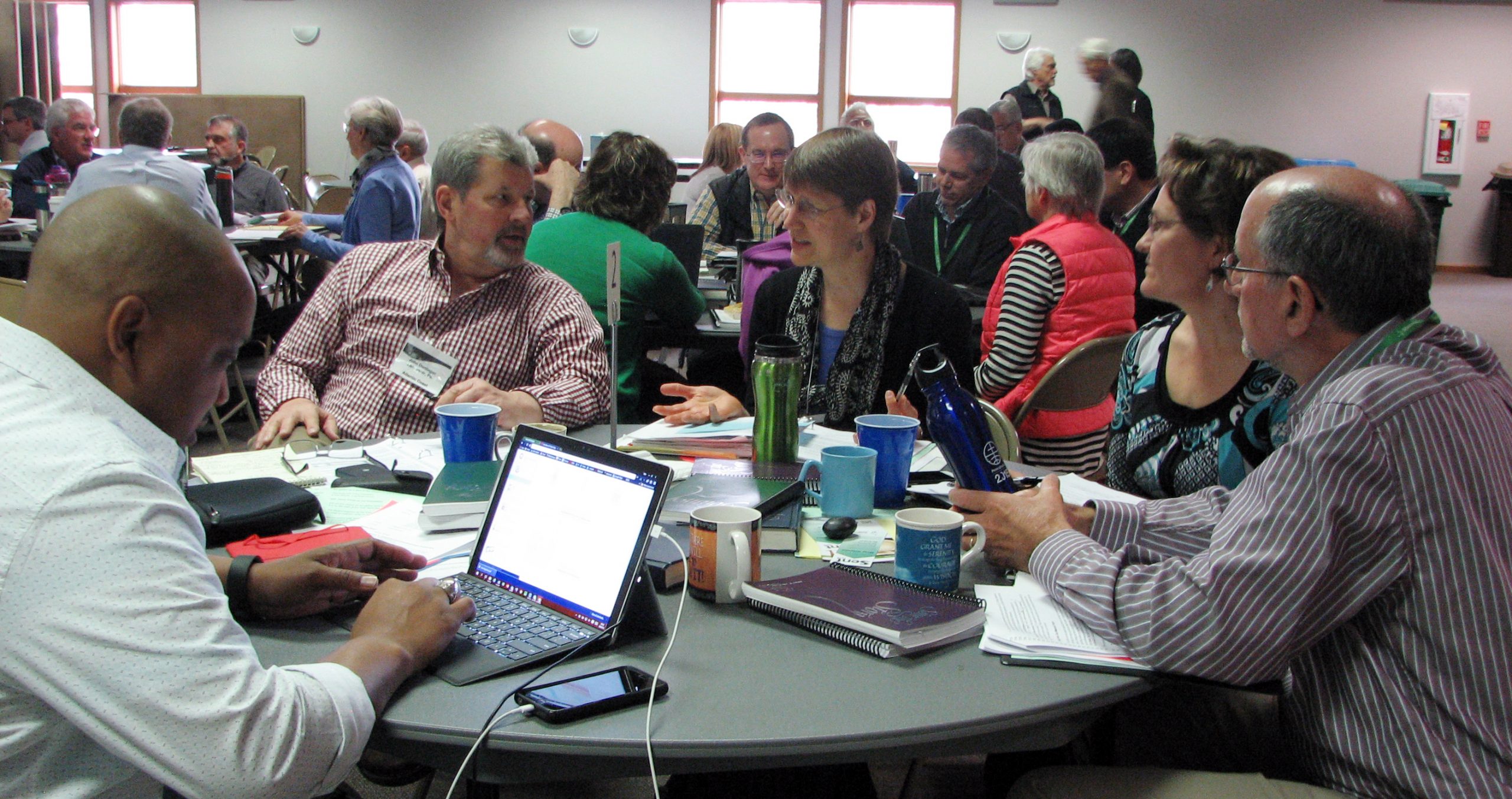
(l. to r.) Glen Guyton, chief operating officer for Mennonite Church USA; John Denlinger, representing Atlantic Coast Conference; Heidi Regier Kreider, representing Western District Conference; Shana Peachey Boshart, representing Central Plains Mennonite Conference; and Howard Good, representing the 14 Lancaster Mennonite Conference congregations who want to remain connected with Mennonite Church USA; at the March Constituency Leaders Council meeting at Silverwood Mennonite Church in Goshen, Indiana. (Photo by Annette Brill Bergstresser)
CLC members offered feedback to a proposal from area conference ministers to implement a peer-to-peer process that the CLC would facilitate. The proposal suggested the appointment of an assessment team of three to five people for three-year terms. The team would conduct an on-site review and, after a process of reporting back to the CLC and receiving feedback, make a final recommendation to the EB.
Questions arose about how the review process would be initiated, how the assessment team would be chosen and whether a recommendation to the EB should always be the expected outcome. The proposal will be revised and discussed again at the October 2016 CLC meeting.
Living into a missional future
On the second day of the meeting, the CLC heard presentations on strategies and best practices for revitalizing the church through mission. James Krabill, senior executive for Global Ministries for Mennonite Mission Network, presented an overview of Fully Engaged: Missional Church in an Anabaptist Voice, a new book he has co-edited with Stanley Green, executive director of Mennonite Mission Network.
“Anabaptists have a word to speak into the current situation we face in a secularizing world where church is less and less important,” said Krabill. “You represent a stream of history that, for the most part, didn’t tap into a Christendom model that assumed the culture would be Christian but saw the church as a group of people calling culture to authentic faith.”
Krabill noted that while the Anabaptist focus on “the earthly Jesus in his ministry” has been a strength and important addition to conversations on mission, Mennonites have a difficult time engaging people “who don’t know the story.”
“While we declare community as the center of our life, we can become dysfunctional for imagining new people as part of the family,” he added.
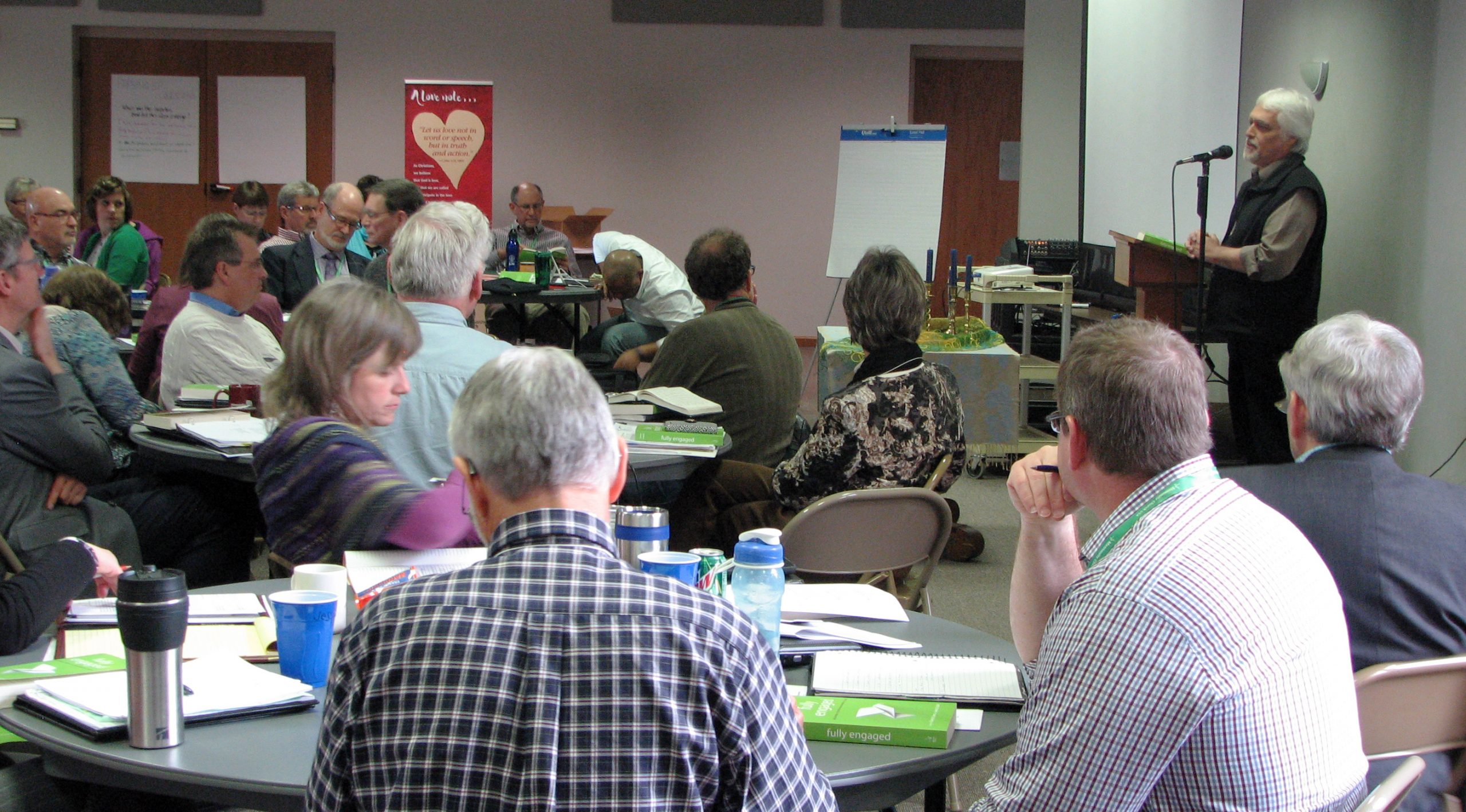
James Krabill, senior executive for Global Ministries for Mennonite Mission Network, presents an overview of Fully Engaged: Missional Church in an Anabaptist Voice, a new book he has co-edited with Stanley Green, executive director for Mission Network, at the March Constituency Leaders Council meeting at Silverwood Mennonite Church in Goshen, Indiana. (Photo by Annette Brill Bergstresser)
Wilbert Shenk, missiologist and retired professor of Mission History and Contemporary Christianity at the School of Intercultural Studies at Fuller Theological Seminary, presented a historical account of the first Mennonite missionaries sent to Africa in 1934, which prompted CLC members to respond.
“I am thankful for the work of early missionaries. However, as I reflect on the colonialism and racism inherent in this movement, I’m wondering how we can tell these stories of mission from the perspective of the receivers,” said Heidi Regier Kreider, conference minister for Western District Conference. “We need to see ourselves as those who need to be evangelized and re-evangelized.”
Lois Barrett, professor at Anabaptist Mennonite Biblical Seminary in Elkhart, Indiana, encouraged congregations and institutions to communally discern their “particular call” toward a missional vocation, and to practice worship as a public witness to “proclaim the reign of God and declare our allegiance.”
Presenters Glen Alexander Guyton, chief operating officer for Mennonite Church USA; Bishop Francisco; and Rod Stafford, pastor at Portland (Oregon) Mennonite Church; shared characteristics and best practices gleaned from church planting experiments and ministering in thriving faith communities.
Worship and open mic time
CLC members spent time worshiping together and praying for one another. Near the close of the meetings, the group surrounded participants from Kansas and prayed for all those affected by the tragic shootings in Hesston on Feb. 25.
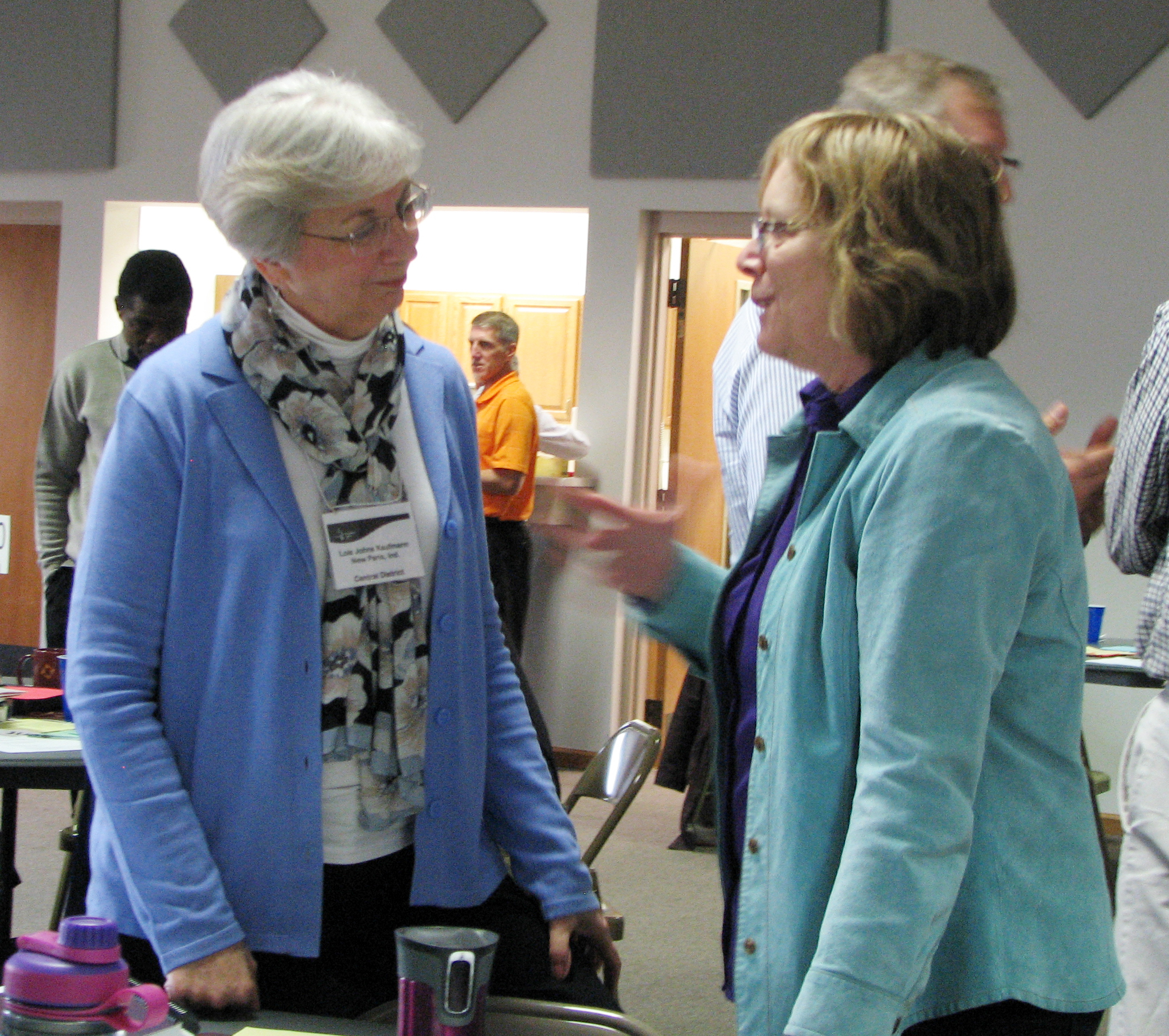
Lois Johns Kaufmann, conference minister for Central District Conference, talks with Nancy Kauffmann, denominational minister for Mennonite Church USA, at the March Constituency Leaders Council meeting at Silverwood Mennonite Church in Goshen, Indiana. At the meeting, Johns Kaufmann was honored for her years of ministry. She plans to retire this summer. (Photo by Annette Brill Bergstresser)
Johns Kaufmann, who was attending the CLC for the last time, was honored for her years of ministry with Central District Conference as she prepares to retire this summer. Reflecting on CLC as a “genius in our system,” Kaufmann shared her love for the church and the grief of letting go, and encouraged the group to continue to “work at building trust.”
During the open mic time, the question of opening up avenues for dialogue with members of the LGBTQ (lesbian, gay, bisexual, transgender, queer) community was raised. At the EB’s February 2016 meeting, the board had voted against a proposal to make the Brethren Mennonite Council for Lesbian, Gay, Bisexual and Transgender Interests (BMC) a constituency group with representatives on the CLC, but encouraged the CLC to continue to explore ways of inviting conversation with LGBTQ church members. A proposal from CLC meeting planners to include LGBTQ conversation partners in table groups at the CLC was turned down by BMC leadership. The CLC did not discuss other options at this meeting.
During open mic sharing, Marv Friesen of Allegheny Mennonite Conference shared a concern that queer leaders are “becoming fatigued and even finished wanting to have conversations in which their humanity is being vetted one more time.” Friesen then proposed an idea to invite allies to participate in table group discussions at future CLC meetings.
Also during the open mic time, Marco Güete, executive conference minister for Southeast Mennonite Conference, reflected on the effects of Lancaster Mennonite Conference’s decision to withdraw from Mennonite Church USA on Iglesia Menonita Hispana (IMH, or the Hispanic Mennonite Church), requesting prayer for the 70 to 80 IMH congregations that remain as full members of the denomination. He offered praise for the Latino leaders present at the CLC meeting who are “blessed to be part of Mennonite Church USA,” and asked for prayer for Sandra Montes-Martínez, the new moderator of IMH, and other Hispanic leaders present at CLC.
“We are part of Mennonite Church USA, and we blessed to be part of Mennonite Church USA,” he said. “IMH is starting over as a new organization. Pray for the leaders; they have big dreams.”
Allen Lehman, conference minister for Franklin Mennonite Conference, shared that the conference’s board has adopted a recommendation to withdraw from Mennonite Church USA, and congregations are being given time to process the matter. A final vote on the resolution is scheduled for April 18.
Jessica Schrock Ringenberg, pastor of Zion Mennonite Church in Archbold, Ohio, requested prayer for meetings of the Ohio Conference of Mennonite Church USA on March 11–12, where delegates would discuss a resolution to leave Mennonite Church USA. Later, during the open mic time, Schrock Ringenberg shared her dreams for the future of the denomination.
“I love the church. I love this group. I recognize that I feel like we are being very short-sighted,” she said. “We spend all our time holding onto the golden age of the past, but we have an opportunity to be much bigger. I know we don’t all agree, but I look forward to being part of a group that loves the church. Can we see this as an opportunity to reinvent ourselves?”
The CLC’s next meeting will be held Oct. 17–19, 2016, in the Hesston/Newton, Kansas, area.
###
Images available:
CLC_mtg_March_2016_Rodger_Schmell_trust_fall.jpg
Rodger Schmell, representing Eastern District Conference, prepares for a “trust fall” into the arms of fellow Constituency Leaders Council (CLC) members representing multiple theological perspectives across the denomination during the CLC’s March 2016 meeting. Lupe Aguilar, representing South Central Mennonite Conference, holds the ladder. (Photo by Janie Beck Kreider)
CLC_mtg_March_2016_Marco_Guete_Michael_Zehr_4229.jpg
Marco Güete, executive conference minister for Southeast Mennonite Conference, talks with Michael Zehr, Southeast Mennonite Conference moderator, at the March Constituency Leaders Council meeting at Silverwood Mennonite Church in Goshen, Indiana. (Photo by Annette Brill Bergstresser)
CLC_mtg_March_2016_Guyton_Denlinger_RegierKreider_PeacheyBoshart_Good.jpg
(l. to r.) Glen Guyton, chief operating officer for Mennonite Church USA; John Denlinger, representing Atlantic Coast Conference; Heidi Regier Kreider, representing Western District Conference; Shana Peachey Boshart, representing Central Plains Mennonite Conference; and Howard Good, representing the 14 Lancaster Mennonite Conference congregations who want to remain connected with Mennonite Church USA; at the March Constituency Leaders Council meeting at Silverwood Mennonite Church in Goshen, Indiana. (Photo by Annette Brill Bergstresser)
CLC_mtg_March_2016_Lois_Kaufmann_Nancy_Kauffmann_4220.jpg
Lois Johns Kaufmann, conference minister for Central District Conference, talks with Nancy Kauffmann, denominational minister for Mennonite Church USA, at the March Constituency Leaders Council meeting at Silverwood Mennonite Church in Goshen, Indiana. At the meeting, Johns Kaufmann was honored for her years of ministry. She plans to retire this summer. (Photo by Annette Brill Bergstresser)
CLC_mtg_March_2016_James_Krabill_4279.jpg
James Krabill, senior executive for Global Ministries for Mennonite Mission Network, presents an overview of Fully Engaged: Missional Church in an Anabaptist Voice, a new book he has co-edited with Stanley Green, executive director for Mission Network, at the March Constituency Leaders Council meeting at Silverwood Mennonite Church in Goshen, Indiana. (Photo by Annette Brill Bergstresser)

